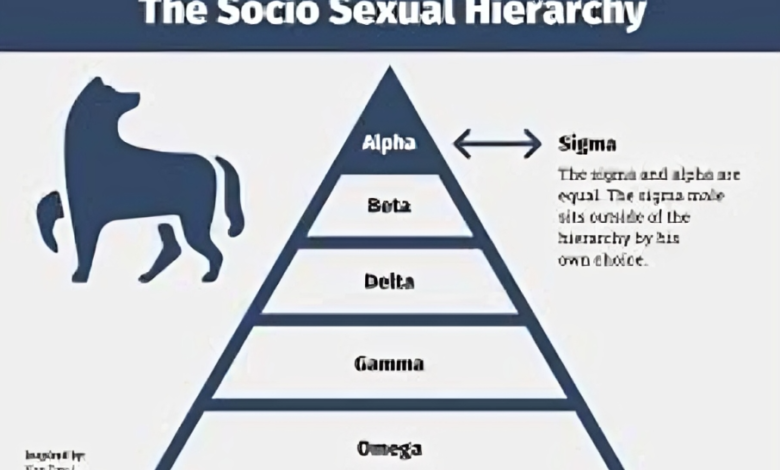The Sigma Male Unpacking the Lone Wolf Persona and Its Rising Popularity

In recent years, discussions about personality types and social dynamics have extended beyond traditional terms like extroverts and introverts. A new term that has captured the attention of popular culture and social media is the “Sigma Male.” Rooted in the broader framework of male archetypes, the Sigma Male represents a unique blend of independence, mystery, and self-reliance, often portrayed as the “lone wolf” who operates outside the conventional social hierarchy. This article explores the concept of the Sigma Male, delves into its defining characteristics, and examines why it has gained popularity in today’s society.
1. Understanding Male Archetypes: Where Does the Sigma Male Fit In?
The concept of male archetypes is traditionally categorized into Alpha and Beta males. Alpha males are often viewed as dominant, confident leaders who thrive in social settings and exhibit extroverted behaviors. Beta males, on the other hand, are seen as supportive, less assertive, and more accommodating.
Sigma males defy these conventional roles by positioning themselves outside the hierarchy. While Alphas and Betas derive their social identities through relationships with others, Sigmas are self-sufficient, valuing freedom and personal autonomy above external validation. This archetype has become increasingly popular as more individuals question societal norms and seek alternative ways to define masculinity.
2. Characteristics of a Sigma Male
The Sigma Male embodies a unique set of traits that distinguish him from the Alpha and Beta. Here are some defining characteristics:
- Independence and Self-Sufficiency: Sigma males prefer to live by their own rules, often choosing solitude over conformity. They’re known to be resourceful and adept at taking care of themselves without relying heavily on others.
- Introverted Confidence: Unlike the overt confidence of Alpha males, Sigmas exhibit a quieter, more introverted form of self-assurance. They do not seek validation from others, nor do they feel compelled to prove themselves in social situations.
- Aloof and Mysterious: The Sigma male often maintains a sense of mystery and detachment, which can make him hard to read. This detachment serves as a buffer against societal pressures, allowing him to operate independently.
- Selective Socialization: Sigma males do not avoid social interactions, but they are highly selective about whom they engage with. They tend to value quality over quantity in relationships, choosing meaningful connections over superficial ones.
- Strong Sense of Purpose: Many Sigma males are driven by personal goals and passions, often prioritizing these over social obligations or societal expectations. This focus on self-mastery and purpose contributes to their self-assured and independent nature.
3. Why Sigma Males Are Popular in Today’s Society
The popularity of the Sigma male archetype reflects a shift in cultural attitudes towards individuality, self-reliance, and nonconformity. With the rise of social media, gig economies, and remote work, people are increasingly embracing independent lifestyles that prioritize personal freedom and flexibility. The Sigma male’s independence resonates with these values, making him a modern ideal for those who seek a life unbound by traditional social expectations.
A Response to Changing Gender Dynamics
As gender roles evolve, many men feel pressure to redefine what it means to be masculine. The Sigma male archetype offers a path that embraces traditional values of strength and self-assurance while discarding outdated notions of dominance and aggression. Instead of competing for social status or influence, the Sigma male is focused on self-fulfillment and personal growth, appealing to those who want to be authentic without compromising their autonomy.
The Appeal of the ‘Lone Wolf’ Mentality
In an era where constant connectivity and visibility are the norms, the Sigma male’s preference for privacy and solitude has a unique appeal. He represents an alternative to the hyper-social, always-online lifestyle, embodying the benefits of introspection, self-knowledge, and selective social interaction. For individuals who feel overwhelmed by social expectations, the Sigma male provides an appealing model for living a life that is both self-sustaining and purposeful.
4. Sigma Male Vs. Alpha Male: Key Differences
The contrast between Sigma and Alpha males highlights the Sigma’s unique appeal. Here are a few key differences:
- Social Hierarchy: While Alphas thrive in hierarchical structures and seek leadership roles, Sigmas operate outside these frameworks. They don’t feel the need to compete for dominance or social validation.
- Motivation: Alpha males are often driven by social status and recognition. In contrast, Sigma males are more intrinsically motivated, focusing on self-mastery and inner satisfaction.
- Social Interaction: Alpha males are often extroverted and enjoy group settings, while Sigmas are more introverted and selective with their social engagements, valuing privacy and independence over social prominence.
- Leadership Style: Sigma males can be effective leaders, but they lead by example rather than by exerting control. Their leadership is often subtle and based on personal merit rather than positional authority.
5. Challenges of Being a Sigma Male
While the Sigma male lifestyle has numerous benefits, it also comes with challenges:
- Loneliness: The Sigma’s preference for solitude can sometimes lead to feelings of loneliness and isolation, especially if he lacks a strong support system.
- Misunderstanding and Stereotyping: Sigma males are often misunderstood by others who may perceive them as aloof, arrogant, or antisocial. This can hinder their ability to form connections and be accepted in social circles.
- Work and Career Limitations: In workplaces that prioritize teamwork and social engagement, Sigma males may struggle to fit in. Their preference for independence can be at odds with collaborative work environments.
6. Sigma Male in Relationships
In romantic relationships, Sigma males often seek partners who respect their need for independence. They may appear emotionally distant at times, but they value meaningful connections. Here’s how their traits play out in relationships:
- Commitment Without Conformity: Sigma males are committed partners, but they do not conform to traditional relationship expectations. They avoid drama, value open communication, and often seek a partner who is equally self-sufficient.
- Focus on Quality Time: Due to their selective nature, Sigma males prioritize meaningful interactions over constant companionship. They appreciate quality time but may also need periods of solitude.
- Respect for Personal Space: For Sigma males, a relationship is healthiest when both partners maintain a degree of independence. They thrive with a partner who values personal space and autonomy.
7. Can Anyone Become a Sigma Male?
The Sigma male archetype is not necessarily innate. While some individuals may naturally embody Sigma traits, others may adopt aspects of the Sigma mentality by cultivating independence, self-awareness, and a strong sense of purpose. Here are a few steps that can help someone develop Sigma-like qualities:
- Build Self-Sufficiency: Cultivate skills that foster independence, such as managing finances, setting personal goals, and developing critical thinking.
- Embrace Solitude: Learn to be comfortable with solitude and use it as an opportunity for self-reflection and growth.
- Prioritize Purpose Over Validation: Sigma males find motivation within themselves rather than from external validation. Focus on defining your own goals and values rather than seeking approval from others.
Conclusion
The Sigma male archetype offers a refreshing alternative to traditional definitions of masculinity, embracing self-reliance, introspection, and autonomy. In an increasingly interconnected world, the Sigma male’s ability to operate independently and pursue a path of self-mastery resonates with those who seek freedom from societal expectations. While this lifestyle comes with its own challenges, the Sigma male’s commitment to authenticity, purpose, and self-sufficiency has made him a compelling figure in contemporary discussions about personality and masculinity.
Whether one naturally embodies Sigma traits or chooses to cultivate them, the principles of the Sigma male—self-reliance, independence, and selective social engagement—serve as a reminder that there is more than one way to define and live a fulfilling life.




